When a customer reaches out to a contact center for help, the last thing they want to face is an agent who comes across as detached. Fortunately, enterprise organizations are realizing the importance of changing this narrative and empowering their agents to deliver more positive and intimate customer experiences.
A recent CCW market study shows 68% of companies believe empathy — the ability to understand others’ feelings — is an essential quality for agents. While truly achieving empathy in customer service interactions might seem difficult when so many calls are coming in each day, the right contact center technology makes this entirely possible.
Discover why empathy is not only so essential to a positive customer experience but how to make it a priority for your contact center.
Why Empathy In Customer Service Interactions Matters
According to the Association for Psychological Science, empathy activates different areas of the brain. It’s a mirror system that can affect your actions, emotions, and sensations, allowing you to connect with others on a deep level and find common ground.
It’s not difficult to understand how exercising empathy would be valuable for contact center agents. Customers call because they need to resolve a problem, which may be simple or complex. Emotions can run high in any of these situations, but more so if the customer feels like their problem isn’t being taken seriously or even if they feel the conversation was too brusque.
When a customer feels heard, on the other hand, the experience is far more positive. Research actually supports this. A 2018 study published in Cogent Business & Management, measured how employee empathy affects customer satisfaction and loyalty. The results of more than 300 surveys show a clear correlation between the two, particularly when it comes to telecommunications.
Empathy Statements Call Center Agents Can Leverage
Now that you have a better understanding of why empathy is so important for supporting positive customer experiences, let’s take a closer look at what it looks like in practice.
Not every attempt to connect with customers will result in a positive interaction. In fact, statements such as “I’m sorry” often do little to make the customer feel understood or valued.
An article from the Journal of Business and Technical Communication examined “stressful” call center interactions to identify which types of statements elicit positive outcomes. While the authors acknowledge there is some variation from one customer to the next, attentive responses and cognitive responses tend to be the most successful.
Here’s a closer look at each category:

Attentive empathy — involves actively listening and absorbing what customers say. Agents can exercise this type of empathy by:
- Paraphrasing what the customer said
- Repeating what the customer communicated to confirm
- Acknowledging what the customer is going through
Cognitive empathy — entails assuming the customer’s point of view in providing a solution. Agents can exercise this type of empathy by:
- Providing the appropriate language the customer needs
- Proposing options for future circumstances the customer may face
- Explaining what other customers have done in the past
Note that there is no perfect empathy statement that a call center agent can use every time to ensure success. Agents also need to be genuine and understand how to respond to and connect with customers based on their unique needs.
Ways Your Contact Center Agents Can Become More Empathetic

When it comes to how you can actively work toward building empathy within your contact center, start by giving employees the tools they need. The right technological infrastructure is key.
Equipping agents with an intelligent cloud-based contact center platform empowers them to work more efficiently and effectively. For example, self-service offerings driven by natural language processing (NLP) allow callers to independently work through simple issues without ever speaking to an agent. In turn, agents are relieved from tedious calls and can be more empathetic to complex issues.
Additionally, interactive voice response (IVR) software that pulls data directly from an organization’s system of record, like ServiceNow, Salesforce, or Microsoft Dynamics, ensures callers connect with an agent who already has the data they need — there’s no need to repeat the same information.
Simply put, artificial intelligence can change customer service by streamlining communication workflows in a way that results in fewer but more substantive calls. Freeing contact center agents from mundane, repetitive tasks makes their work more satisfying and leaves them feeling empowered to make genuine connections with customers.
It’s also critical to foster a culture that empowers contact center agents to exercise empathy. Focusing on kindness, authenticity, and personal connection makes a huge difference in improving customer engagement. Leaders should set the tone to provide a positive model for their employees.
What if your contact center already has high customer satisfaction? You should always be looking for ways to improve. One particularly effective way to do this is to measure agents’ emotional intelligence through scorecards. You can even ask agents to score themselves to self-identify areas of opportunity.
Once you’ve conducted an initial round of scoring, you’ll be able to establish benchmarks that you can measure against going forward. This is even easier to accomplish with advanced reporting and speech analytics. With these solutions, you can gain full visibility into agent performance and identify coaching opportunities to help them hone their skills. Remember, even incremental improvements can affect customer satisfaction and, ultimately, your bottom line.
Drive Connections — And Results
With the right technology and support, your contact center agents will be able to start exercising empathy in their day-to-day work. They’ll feel empowered to connect with callers in a way that increases the odds of a successful customer experience.
Working toward a more empathetic contact center is critical for driving positive experiences and improving your organization as a whole. But a fully enabled call center solution is just as valuable for fueling incredible customer service outcomes. With the right mindset and the right tools, positive performance metrics are bound to follow.




